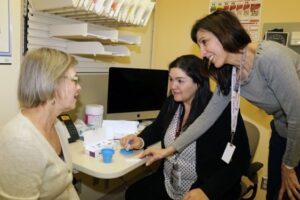The Farncombe Nutrition Initiative (FNI) was founded in 2022 with a generous donation from the Balsam Foundation. Its ambitious goal is to create a one-of-a-kind hub that combines scientific discoveries and evidence with expert training opportunities and a personalized medicine approach to nutrition, wellness, and care that can be replicated worldwide. Its establishment was based on the success of our preclinical research that investigates the complex relationship between the food we ingest, the microbiota and our bodies in health and the expression and treatment of diseases. The nutrition initiative is designed to create a platform for the translation of this work into humans. It is also designed to advance our understanding of what people eat and why, and the barriers that exist to dietary change.
Drs. Verdu, Caminero, Bercik, Collins and Khan are the drivers of the preclinical work that will be translated into human in the clinical component of the Nutrition Initiative.
Expandable List
Dr. David Armstrong
Webpage: https://experts.mcmaster.ca/display/armstro
FINI Website: https://www.farncombenutrition.ca
Dr. David Armstrong, a renowned leader in gastrointestinal nutrition, leads FNI’s multidisciplinary team, which includes gastroenterologists with vast experience in clinical nutrition, dietitians, social workers, psychologists, and researchers, with the goal of bringing an integrated and personalized approach to patient care. Armstrong is a renowned leader in gastrointestinal (GI) nutrition. He is recognized internationally for his work in the prevention and treatment of digestive disorders such as celiac disease, inflammatory bowel disease (IBD), intestinal failure, irritable bowel syndrome (IBS), non-alcoholic fatty liver disease (NAFLD) and food sensitivities.With more than 220 peer-reviewed publications to his name, Armstrong has made it his personal mission to advance the state of nutrition sciences and education. He is the founder and medical director of the Hamilton Health Sciences specialized nutrition program and chair of the hospital’s Nutrition Best Practices Committee. He also led annual nutrition workshops for nurses, dietitians and community practitioners between 1996 and 2012. He currently directs the Farncombe Nutrition Initiative.
Dr. Maria Ines Pinto-Sanchez
Dr. Pinto-Sanchez: https://experts.mcmaster.ca/display/pintosm
Celiac Clinic: https://www.mcmasterceliacclinic.ca/
 Dr. Pinto-Sanchez is an Associate Professor from the Gastroenterology Division at McMaster University and Hamilton Health Sciences and an active Farncombe Family Digestive Health Research Institute member. She is the Director of the adult Celiac Clinic at McMaster University , the only clinic in Canada certified by its quality by the SSCD (https://www.theceliacsociety.org/cdurp_recognition ), and provides nutrition support to the Home Parenteral Nutrition Program and Intestinal failure clinic. Supported by the Farncombe Nutrition Initiative, she has developed a unique nutrition assessment clinic based on calorimetry, a precise tool to measure energy needs in patients with chronic gastrointestinal conditions. She has over 80 publications in high-impact journals focusing on celiac disease and nutrition. Dr. Pinto-Sanchez is currently supervising several undergraduate and graduate students and postgraduate trainees, and supports the celiac community as part of the Professional Advisory Council -Celiac Canada (https://www.celiac.ca/healthcare-professionals/professional-advisory-council/). She has influenced policy change to cover celiac test in Ontario, advocated by Celiac Canada and supported by the Celiac Clinic at McMaster and Farncombe Family Digestive Health Research Institute https://www.celiac.ca/celiac-blood-test-covered-by-ohip-for-next-6-months-in-ontario/)
Dr. Pinto-Sanchez is an Associate Professor from the Gastroenterology Division at McMaster University and Hamilton Health Sciences and an active Farncombe Family Digestive Health Research Institute member. She is the Director of the adult Celiac Clinic at McMaster University , the only clinic in Canada certified by its quality by the SSCD (https://www.theceliacsociety.org/cdurp_recognition ), and provides nutrition support to the Home Parenteral Nutrition Program and Intestinal failure clinic. Supported by the Farncombe Nutrition Initiative, she has developed a unique nutrition assessment clinic based on calorimetry, a precise tool to measure energy needs in patients with chronic gastrointestinal conditions. She has over 80 publications in high-impact journals focusing on celiac disease and nutrition. Dr. Pinto-Sanchez is currently supervising several undergraduate and graduate students and postgraduate trainees, and supports the celiac community as part of the Professional Advisory Council -Celiac Canada (https://www.celiac.ca/healthcare-professionals/professional-advisory-council/). She has influenced policy change to cover celiac test in Ontario, advocated by Celiac Canada and supported by the Celiac Clinic at McMaster and Farncombe Family Digestive Health Research Institute https://www.celiac.ca/celiac-blood-test-covered-by-ohip-for-next-6-months-in-ontario/)
Infrastructure:
FNI has established three clinics, including the IBD Nutrition clinic, led by Dr. Armstrong inaugural holder of the Douglas Family Chair in Nutrition Research (https://brighterworld.mcmaster.ca/articles/david-armstrong-douglas-family-chair-nutrition-research/), and the McMaster Celiac Clinic and Calorimetry Clinic, led by Dr. Ines Pinto-Sanchez (https://experts.mcmaster.ca/display/pintosm ). Supported by the Farncombe Nutrition Initiative, she has developed a unique nutrition assessment clinic based on calorimetry, a precise tool to measure energy needs in patients with chronic gastrointestinal conditions. Dr Pinto-Sanchez established and runs Canada’s only adult celiac disease clicin recognized by the The International Societty for the study of celiac diseas: https://www.mcmasterceliacclinic.ca/ and https://farncombe.mcmaster.ca/clinical/celiac/
An important part of FNI’s mission is to understand the basis for dietary choices, including economic and cultural factors, and to make evidence-based recommendations to improve dietary intake and health in the community across different cultures and low-income groups.
“Patients face many and varied challenges in adhering to nutrition therapies. My goal is to identify patients’ barriers to adopting new diets and empower them to manage their symptoms and live a life free of pain and discomfort,” said Dr. David Armstrong.
Many of our basic research foci in our Institute investigate how the microbiota interact with the host to maintain health or to facilitate the expression of disease. Several of these investigations, that include the basic animal models of celiac disease, the role of fermentable carbohydrate and other nutrient components in IBS, and the metabolic activity of the microbiota on essential aminoacids like tryptophan, additives and processed foods in IBD, link directly to the mission of the NI. The clinical component of the nutrition initiative involves physicians, dieticians, and psychologists as well as IT specialists and is supported by the Institute. It provides an enriched environment in which to train the next generation of gastroenterologists-nutritionists. Between 1-2 annual nutrition fellowships are available to gastroenterologists who have completed their formal training.

- 1% of households in Ontario were food insecure in 20211
- 1 in 5 people in Hamilton experiences hunger every day2.
- Our commitment to our patients’ health and well-being extends beyond medical care, as we recognize the vital role of addressing food insecurity. Therefore, we have established a dedicated working group at the Farncombe Nutrition Initiative to develop initiatives and programs to address this ever-growing issue.
1Tarasuk V, Li T, Fafard St-Germain AA. (2022) Household food insecurity in Canada, 2021. Toronto: Research to identify policy options to reduce food insecurity (PROOF) 2Hamilton Hunger Report 2022, by Hamilton Food Share organization
Current Initiatives:
- Surveying for food insecurities and referral process to a social worker. We developed a survey tool to assess food insecurity.
- Handouts created with tips and resources for celiac/ GI patients with food insecurities
- Discounts provided for gluten-free foods, supplements and vitamins
- Food Resources Card with access to local resources online
- Workshops about food insecurity and mental health in digestive diseases
- Collaboration with community partners to address needs
- Continued Research on the prevalence and characteristics of food insecurity in our patient population
- Grocery gift card Program (under development)
- Food Rx Program (Food prescription) (under development)
FNI Food Resources Card


